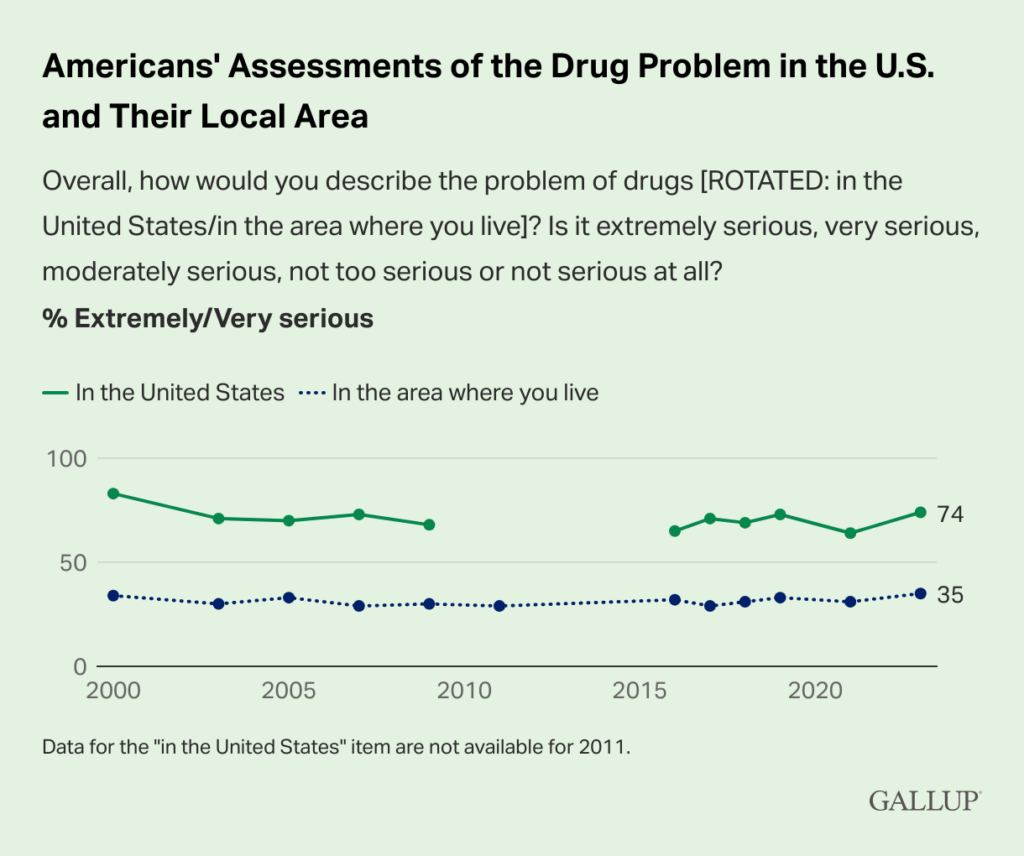A majority of Americans now say that the U.S. is losing ground in the country’s “illegal drug problem,” according to a new Gallup poll. And at the same time, support for taking a fundamentally different approach to marijuana by enacting legalization has reached a record high.
The survey shows that 52 percent of respondents believe that the U.S. has “lost ground” in the drug war, while 24 percent said that the country has made progress. That’s a major reversal in public opinion compared to the last time Gallup asked Americans about the issue in 2019. At that time, a plurality (41 percent) was optimistic about progress, while 30 percent said the country was losing ground in combating illegal drugs.
Via Gallup.
That 22-point difference over the course of four years can likely be attributed to growing awareness and concern about the opioid overdose epidemic, which has compounded as fentanyl and other synthetic analogues have proliferated in the drug supply.
Part of the shift could also reflect a growing awareness that the decades-long focus on criminalization at the center of government drug strategies has not worked.
In any case, there are notable partisan divides in attitudes about progress in addressing drug issues, the new poll shows.
“Republicans are extremely negative about U.S. progress on illegal drugs, with 12 percent believing the U.S. is making progress and 75 percent losing ground,” Gallup’s analysis, published on Friday, says. “Independents are also decidedly pessimistic, with 22 percent believing progress is being made and 52 percent thinking the situation is getting worse.”
Via Gallup.
“In contrast, more Democrats think the situation is improving (40 percent) than worsening (27 percent),” it says. “These party differences underscore the importance of the match between a person’s partisanship and the incumbent president’s party in evaluating the drug situation.”
It’s possible that the media has partly fueled the sharply negative perspective on the issue, with certain sensationalized coverage feeding into a narrative that attempts to link rampant substance misuse with progressive policies and politicians, for example.
Another data point from Gallup seems to speak to that, showing that while nearly three in four Americans (74 percent) say that the country’s drug problem is either “very” or “extremely” serious, just 35 percent say the same about the situation in the area where they live.
Via Gallup.
Republicans and independents rate the situation in their local area similarly, with 40 percent of Republicans and 37 percent of independents saying the local drug problem is extremely or very serious,” Gallup said. “Democrats, at 27 percent, are less inclined to believe this.”
The polling firm didn’t define what constitutes a “drug problem” in the country, but the firm pointed out that the results come amid an “alarming spike in the number of U.S. adults succumbing to overdoses of opioids and other dangerous drugs.”
“Americans generally see little progress in addressing the illegal drug problem in the nation. The public has never been more pessimistic than they are today, at least in the years Gallup has collected data on the matter,” the analysis concludes. “Greater concern about U.S. progress could lead to drugs being a more significant campaign issue in next year’s presidential election than it has been in recent elections, which would put more pressure on candidates to devise plans for addressing the problem.”
Indeed, the fentanyl overdose epidemic has been discussed at all three of the 2024 Republican presidential primary debates so far this year, with certain candidates like Florida Gov. Ron DeSantis (R) calling for a militarized response targeting drug traffickers. Others, such as former New Jersey Gov. Chris Christie (R), have emphasized the importance of addressing the demand side of the issue by focusing on preventative care and addiction treatment.
Marijuana, in contrast, hasn’t taken center stage so far in the 2024 conversation, which is perhaps a reflection of the growing bipartisan consensus around ending federal cannabis prohibition. Gallup released survey results last week that showed support for legalization at a record 70 percent nationally, and that includes 55 percent of Republicans.
Despite majority support for legalization among Republicans, however Gallup pointed out in a report earlier this year that a partisan divide has widened over the past two decades as Democrats have been even quicker to embrace the issue.
In terms of broader drug policy perspectives, a 2021 poll from the ACLU and Drug Policy Alliance (DPA) that was released ahead of the 50th anniversary of President Richard Nixon declaring the drug war found that two-thirds of American voters support decriminalizing simple possession of currently illegal substances.
Read More Feedzy

